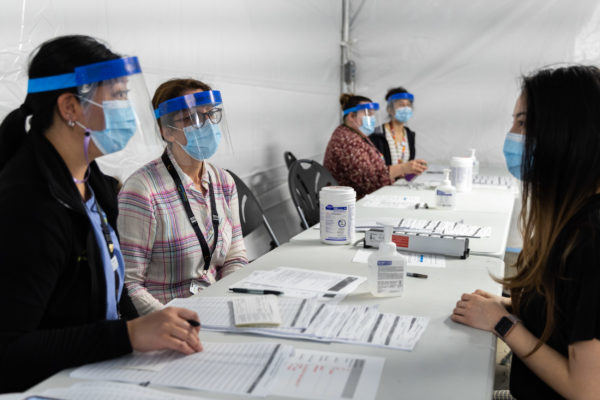
(COVID-19 vaccinations begin/Province of British Columbia/Flickr)
by Chris Morris and Vinay Bhargava
As countries undertake the world’s largest vaccination drive, the innovation, expertise, and community reach of civil society organizations should be a key component.
The remarkable breakthrough with COVID-19 vaccines has raised hopes for saving lives and accelerating the much-needed social and economic recovery around the world. But success will depend on the transparency, speed, coverage, and equity of the roll-out of vaccination programs.
Given the unprecedented scale of this undertaking, as well as the numbers and logistics involved, this will be extremely challenging. A key but previously underutilized set of actors can step in to alleviate the burden: civil society organizations.
Governments should collaborate with civil society organizations to undertake the historic task of vaccinating whole populations.
Models for civil society organization collaboration with governments and donors exist at local and national levels and can be scaled up to improve vaccination campaigns. Civil society organizations, with sizable presence across Asia and the Pacific, have begun supporting governments’ COVID-19 response programs.
The Vaccine Alliance, referred to as GAVI, has involved civil society organizations in its global immunization efforts for years, with more than four thousand organizations participating. In many countries, civil society organizations deliver up to 65 percent of immunization services, according to GAVI. They also help to strengthen health systems, train health workers and supporting logistics.
COVAX, the global initiative to provide innovative and equitable access to COVID-19 vaccines for people in all corners of the world regardless of their wealth, is working closely with civil society organizations. Around the world, civil society organizations are creating awareness, participation and demand for immunization at the community level, particularly in hard-to-reach communities.
At national and local levels, and in fragile and conflict affected areas, civil society organizations and governments build on their experience working together on immunization and other health services in the following areas:
- Community outreach to educate, dispel misinformation, and influence behaviors
- Assess and mitigate the main reasons for vaccine hesitancy
- Identify those who are vulnerable to missing vaccinations due to demand barriers (e.g., mobility, language, identity, remoteness, etc.), and take remedial measures
- Monitor compliance with the vaccine allocation criteria, help close gaps in vaccine service delivery, and provide vaccinations when authorized
- Monitor integrity in procurement and distribution of vaccine-related goods and services
- Work with audit and anti-corruption agencies using participatory methods
Civil society organization engagement along one or more of these six pathways would require cooperation, support, and funding from government authorities. One approach to civil society organization engagement in vaccination programs will not fit all situations, and engagement should be selective, contextualized and fully funded. Past experience and evidence indicate that when these conditions are present, collaboration between civil society organizations and government can produce impressive results.
Governments should collaborate with civil society organizations to undertake the historic task of vaccinating whole populations.
This partnership has helped create lifesaving behavioral changes among at-risk population groups while improving implementation of vaccination programs through community engagement. It can also produce effective feedback loops between citizens and local officials.
Public officials have shown increased responsiveness and accountability when civil society organizations are involved and there is evidence of reduced corruption in the delivery of services, as well increased economy and efficiency in public procurement and distribution.
Such a partnership increases trust between communities and government authorities, and results in greater inclusion of marginalized or vulnerable groups.
Many governments in Asia and the Pacific have mechanisms for consultations and cooperation with civil society organizations in development programs, including within COVID-19 response programs that can be used for dialogue on scope and modalities of civil society engagement in vaccine delivery.
One program, backed by ADB, is seeking to help countries in Asia and the Pacific engage with civil society organizations to mitigate the impact of COVID-19 through work in local communities. This program can also be used to increase coverage and equity of COVID-19 vaccination programs across the region.
Asia is the most populous region in the world and mass vaccinations will be among the most challenging tasks in recent history. The innovation, expertise, and community reach of civil society organizations should be a key component is helping countries achieve their vaccination goals.
Chris Morris is the principal social development specialist at the Asian Development Bank’s NGO and Civil Society Center. You can follow him on Twitter @cmorris808.
Vinay Bhargava is the chief technical officer at the Partnership for Transparency. You can follow him on Twitter @vinayglobal.
This article was originally posted on Asian Development Blogs. The views expressed in this article are solely those of the author and do not necessarily reflect the official policies of PTF.
You can follow the Partnership for Transparency on Twitter @PTFund and on Facebook at Partnership for Transparency Fund.

